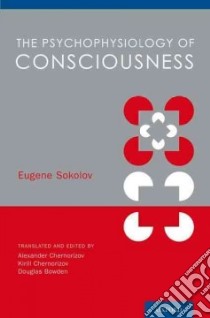The Psychophysiology of Consciousness - 9780199934355
Un libro in lingua di Sokolov Eugene N. Chernorizov Alexander (EDT) Chernorizov Kirill A. (EDT) Bowden Douglas M. (EDT) edito da Oxford University Press, 2013
- € 94.20
- Il prezzo è variabile in funzione del cambio della valuta d’origine
This is the last major work of Eugene N. Sokolov, Professor of Psychophysiology at Moscow State University from 1950 to 2008. It summarizes the contributions of a lifetime on the neural mechanism of consciousness. Working at the intersection of psychology, neurophysiology and mathematics, Sokolov early introduced the concept of quantifiable 'difference in neuronal activity' and 'cognitive distance' as corresponding metrics in the physical and mental models of reality. He demonstrated the power of multidimensional vector mathematics to represent the neural computations that mediate between the brain's neural model and the mind's mental model of reality.
Sokolov and colleagues showed a mathematical commonality among the neuronal mechanisms that mediate the perception of basic features of visual stimuli including color, brightness, line orientation and motion. This led to a general vector model linking perceptual and memory processes to adaptive motor mechanisms. They extended the model to encompass broader, more complex functions, such as the perception of emotions in facial expressions, semantic differences in verbal stimuli and differential executive control mechanisms. Integrating evidence from human psychophysics, animal neurophysiology and vector mathematics they developed a unified model to characterize quantitatively many complex relations between objective and subjective aspects of reality.
Sokolov's studies of neuronal mechanisms of mental phenomena led him to distinguish two categories of neurons: 'consciousness neurons' directly associated with awareness of perceptual, emotional and cognitive events, and neurons that are necessary for, but not directly involved in, conscious processes. The book integrates his findings with major themes shaping twenty-first century understanding of the brain-mind relationship. It relates the findings both to work of other Russian investigators, such as Pavlov, Luria, and Rusinov, and to work of many Western researchers, including von Bekesy, Eccles, Edelman, Ehrenstein, Grossberg, John, Koch and Crick, Ledoux, Llinas, Milner, Penfield, Penrose, Posner, and Schrödinger.
Informazioni bibliografiche
- Titolo del Libro in lingua: The Psychophysiology of Consciousness
- Lingua: English
- Autori : Sokolov Eugene N. Chernorizov Alexander (EDT) Chernorizov Kirill A. (EDT) Bowden Douglas M. (EDT)
- Editore: Oxford University Press
- Collana: Oxford Univ Pr (Hardcover)
- Data di Pubblicazione: 14 Giugno '13
- Genere: PSYCHOLOGY
- Argomenti : Consciousness Neuropsychology
- Pagine: 222
- EAN-13: 9780199934355


